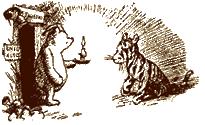It’s a little known fact that the inspiration for A.A.Milnes’ Winnie The Pooh stories stretches as far back as the first World War however, an even lesser known fact about our favourite honey loving character is that he was originally named, Edward Bear.
Over the years there have been many adaptations of the original Pooh Bear stories; from films that have been touched by the magic of Walt Disney, to new adventures stories for a modern generation, but never the less, the origins of how Winnie The Pooh came to be one of the most adored children’s characters still remains the same.
 A.A Milne took inspiration from his son, Christopher Robin who had a collection of stuffed animals and a love for a certain bear (named Winnie) who had managed to find himself residing at London Zoo from the winter of 1919 until he sadly died in 1934. Christopher Robin Milne would spend endless amounts of time at London Zoo with the small black bear, even spending time with him in his cage, and it was this adoration that led Christopher Robin to rename his own teddy bear ‘Winnie’.
A.A Milne took inspiration from his son, Christopher Robin who had a collection of stuffed animals and a love for a certain bear (named Winnie) who had managed to find himself residing at London Zoo from the winter of 1919 until he sadly died in 1934. Christopher Robin Milne would spend endless amounts of time at London Zoo with the small black bear, even spending time with him in his cage, and it was this adoration that led Christopher Robin to rename his own teddy bear ‘Winnie’.
Previously known as Edward bear, Winnie, Christopher Robin Milne, and a number of other stuffed animals that we now recognise as Piglet, Tigger, and Eeyore, became the centre of a new world for author A.A Milne; bringing the bear to life, giving the small group of creatures an adventurous existence in the Hundred Acre Wood. Taking inspiration from all that was around him, A.A Milne created a timeless set of characters that was, and still is, cherished by children and adults alike.
Referring back to the original book “Winnie-the-Pooh”, author A.A. Milne writes the following in his introduction:
“Well, when Edward Bear said that he would like an exciting name all to himself, Christopher Robin said at once, without stopping to think, that he was Winnie-the-Pooh. And he was.”
So there we have it; a solid confirmation from A.A Milne himself that Winnie The Pooh’s real name is actually Edward Bear. It was changed because of his son’s love of Winne, the new attraction at London Zoo, and it is for this love of Winnie that we have to thank for the creation of ageless literature that will go on to be ever popular for generations to come.
